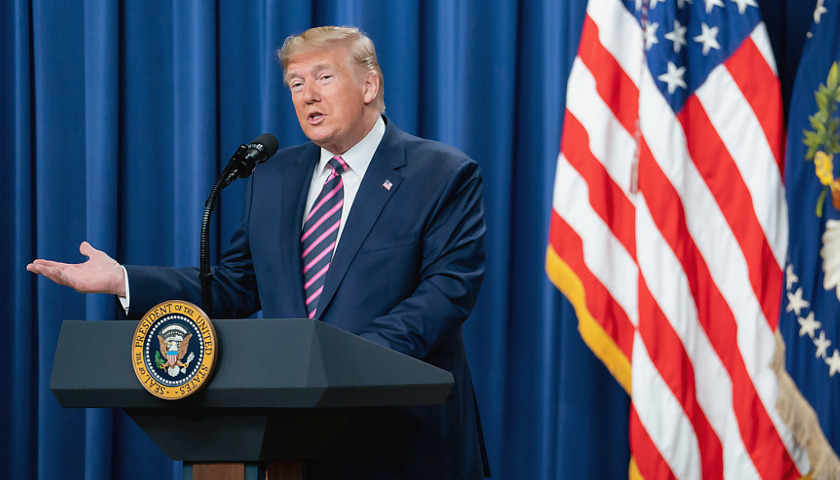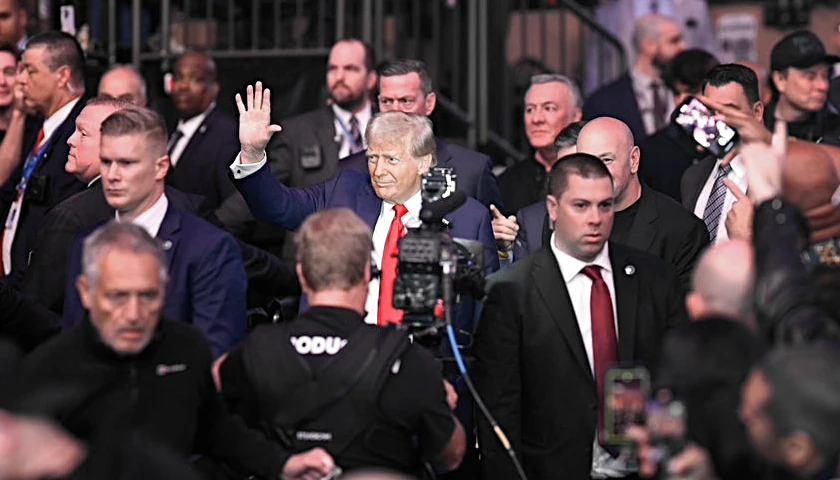by Nicholas L. Waddy
As Democrats in the House of Representatives prepare themselves for a vote on the articles of impeachment against President Trump – preparing the way to boot him from office and nullify the results of the 2016 election – Americans should reflect on the audacity it takes to do that.
Neither of the articles of impeachment references a specific crime that exists in any statute book. Instead, the Democratic leadership has made up two brand new offenses: “abuse of power” and “obstruction of Congress.” What these charges have in common, in addition to their novelty, is their vagueness, which makes them profoundly unsuitable to serve as the grounds for the cancellation of the people’s will, as expressed in the last presidential election.
With respect to “abuse of power,” while the media has obsessed over questions of a “quid pro quo” involving pressure on Ukraine to investigate the Bidens in return for military aid, the truth is that the substance of the Democrats’ charges relates to Trump’s motivations, not his actions.
Pressuring foreign governments to act in certain ways is absolutely normal in the conduct of U.S. foreign policy. It is, therefore, the Democrats’ charge, as stated in the article of impeachment, that Trump pressured Ukraine to “announce investigations that would benefit his reelection, harm the election prospects of a political opponent, and influence the 2020 United States Presidential election to his advantage,” that really matters.
In other words, Trump acted “for corrupt purposes in pursuit of personal political benefit . . . [He] compromised the national security of the United States . . . [and] ignored and injured the interests of the Nation.”
That, at the end of the day, is the substance of the Democrats’ case against President Trump: they allege he betrayed the country and his oath of office.
No Proof Behind the Allegations
The most obvious problem here is that the Democrats have advanced no proof that President Trump’s Ukraine policy is or was guided by his desire to win the 2020 election. They consider this notion to be incontestable, since, by process of elimination, they can think of no other reason why anyone would suspect the illustrious Biden family of wrongdoing. This is a long way from proving President Trump’s corrupt motivations, however.
But there is a deeper, more fundamental flaw in the Democrats’ “abuse of power” allegation. We should recall that every president, and every member of Congress, is subject to election and reelection. It is seldom the case that any elected official will make important decisions without reference to his or her “personal political” interests. Moreover, whether those decisions, taken in part to advance one’s political career, ultimately redound to the benefit or harm of the nation is inherently subjective.
The Democrats thus have advanced a new standard for impeachment – that no politician should ever behave politically – which, on its face, is impossible to sustain because of its ambiguity and its incompatibility with political reality.
How many of President Obama’s actions, for instance, were derided by Republicans as driven by “personal political” motives? How many, according to Republicans, “harmed” the nation? Democrats are plunging us into an impeachment maelstrom, wherein any federal officeholder could be – and perhaps will be – impeached at the slightest provocation if the House of Representatives is ill-disposed towards him or her and suspects that the underlying motivations of any action were “political.”
Truly Unprecedented Maneuvers
The truth is that this new, improvised, and ambiguous philosophy of impeachment is itself an “abuse of power.” Those insisting on it should be punished accordingly, but not through a politicized impeachment process. They should be evicted from office by the voters at the earliest opportunity: in 2020.
The same logic applies with respect to the Democrats’ second article of impeachment, which charges President Trump with “obstruction of Congress.”
The Democrats claim Trump has “directed the unprecedented, categorical, and indiscriminate defiance of subpoenas issued by the House of Representatives pursuant to its ‘sole Power of Impeachment’.” They further allege that “no President has ever ordered the complete defiance of an impeachment inquiry or sought to obstruct and impede so comprehensively the ability of the House of Representatives to investigate . . .”
The first flaw in this logic is that Congress, if it sorely wished to, could compel the testimony of any administration official or obtain any relevant document to litigate the matter to a satisfactory conclusion. If, as the Congress claims, it is unconstitutional to deny the Judiciary Committee, say, the testimony of Mike Pompeo or John Bolton vis-a-vis the impeachment inquiry, then why not solicit the federal courts, up to and including the Supreme Court, to issue an order compelling them to comply?
That is precisely how the standoff with President Nixon in 1974 was ultimately resolved: the Supreme Court ordered Nixon to hand over the Oval Office tapes, and he did so. Congress could pursue the same remedy now, but it refuses because it is in a headlong rush to impeach President Trump – for what are transparently “personal political” reasons: Congress hates Trump, but it also wants to dispose of impeachment before the start of an election year.
Once again, though, there is a deeper, more fundamental problem with the Democrats’ case against President Trump for “obstruction of Congress.” It is absolutely normal for presidents to refuse to turn over documentation to Congress and to order administration officials not to appear at hearings. This is called “executive privilege.” The executive branch need not accede to every request of Congress for information, because there is a presumption that the proper functioning of the executive requires a degree of privacy and discretion.
The Judiciary Committee’s fig leaf to conceal this gaping hole in their rationale for impeachment is that Trump’s non-cooperation with House investigations has been “unprecedented” and “comprehensive” – two more ambiguous standards that, once again, could arguably be applied to any president, in any era, failing to comply with a congressional subpoena for any reason.
A disagreement about the extent of executive privilege, however, should not constitute an impeachable offense.
Novel Arguments Threaten Every Future President
Take the “Fast and Furious” scandal. The Obama Administration decided to sell guns to Mexican criminals in order to obtain intelligence on the drug cartels for which some of them worked. The intelligence never materialized, but a Border Patrol agent was killed by one of the guns.
When the scandal came to light, House Republicans understandably wished to obtain testimony and documents from the administration about this travesty. The Obama Department of Justice refused to comply, citing executive privilege. Ultimately, the House held Attorney General Eric Holder in contempt of Congress, and a federal court upheld the legislative branch’s right to receive the information.
By the logic of the Judiciary Committee’s Democrats, this “unprecedented” failure to comply with a congressional investigation should have been an impeachable offense. The fact that a federal court found that executive privilege did not apply in the “Fast and Furious” case suggests that the actions of the attorney general – and presumably of those of the president – were unconstitutional. Yet neither man was impeached.
For better or worse, House Republicans respected the gravity of impeachment and preferred to let voters render a verdict on the fitness of President Obama and his attorney general. Today, however, Trump-hating Democrats prefer to substitute their own judgment for that of the American electorate. They would happily impeach Donald Trump on any pretext, because it is what their infuriated electoral base demands.
In the end, the House Democrats have invented two novel justifications for the removal of a president from office, and they have crafted these justifications in such a way that they can be used against any president, now and in the future, who rubs Congress the wrong way.
By jettisoning Congress’s traditional restraint on matters of impeachment, and seeking to remove President Trump for alleged wrongdoing that is not susceptible to proof beyond a reasonable doubt, Democrats are opening the floodgates to a wave of “personal political” impeachments that may arise in the decades ahead. Future American politicians may thus view the results of U.S. federal elections not as determinative of the country’s leadership, but as mere suggestions from the voters, which may be vetoed by our all-knowing political elite. By no means should this very real abuse of power by House Democrats be tolerated by the American people.
– – –
Nicholas L. Waddy, an associate professor of history at SUNY Alfred, blogs at www.waddyisright.com.




